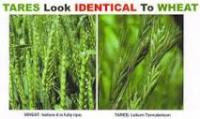
Darnel is a noxious weed which closely resembles wheat. Its seeds are poisonous, and eating them can be fatal. The fact that wheat and darnel grow together is symbolic of our own individual make-up and that of society. There is good and evil in all of us. When it ripens, darnel turns black in contrast to wheat which turns brown. Thus at the end of time things will be made clear but only God can be the judge. As humans we can see sinful acts but we cannot decide the goodness or badness of another person.
God often brings good out of evil. In the Book of Exodus, we read how pharaoh ordered the Hebrew boys to be killed. Yet it was his daughter, an Egyptian princess, who rescued Moses and brought him up in the court so he received a good education and was thus prepared to lead his people. Abraham Lincoln is said to have claimed that he destroyed his enemies by making them his friends. He appointed Edwin Stanton as secretary of war, although Stanton had previously described him as a “gorilla, an imbecile and a disgrace!”. The president said that Stanton was the best man for the job. He was able to see beyond personal antagonism. When Lincoln was assassinated Stanton said, “There lies the most perfect ruler the world has ever seen.”
In his poem Strange Meeting Wilfrid Owen, who died at the end of the First World War, imagined meeting the enemy he had killed, who addressed him as “friend.” The so-called foe showed him how it was the evil of war that had made them adversaries and in different circumstances they might have been companions.
“I am the enemy you killed, my friend.” (Wilfred Owen, Strange Meeting)